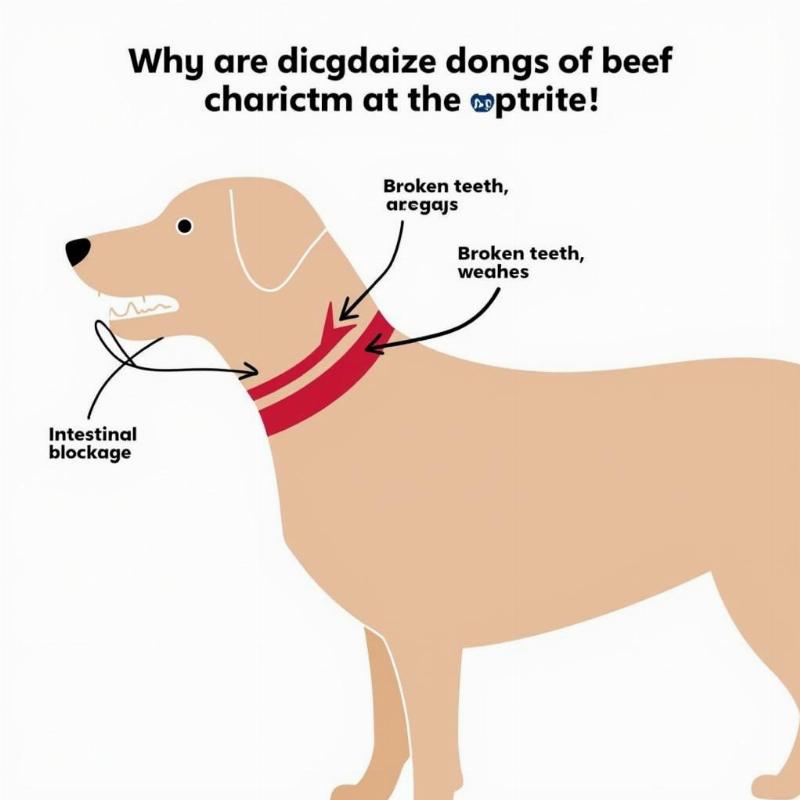Beef neck bones are a popular treat for dogs, but are they safe? Many dog owners wonder if these seemingly durable chews are a good option for their furry friends. This article will delve into the benefits and risks of feeding beef neck bones to your dog, providing you with the information you need to make an informed decision. We’ll explore the nutritional value, potential hazards, and best practices for offering this treat safely.
Understanding the Appeal of Beef Neck Bones
Why are beef neck bones so attractive to dogs, and why do owners consider them? Chewing is a natural instinct for dogs, providing mental stimulation and helping to keep their teeth clean. Beef neck bones offer a satisfying chew, often keeping dogs entertained for extended periods. They’re also a good source of certain nutrients. However, it’s crucial to understand the potential dangers before offering them to your dog.
The Nutritional Benefits and Risks of Beef Neck Bones
Beef neck bones contain valuable nutrients like calcium, phosphorus, and glucosamine, which can contribute to bone and joint health. However, these bones are also high in fat, which can lead to weight gain and pancreatitis in some dogs.
Potential Hazards of Feeding Beef Neck Bones
While offering some benefits, beef neck bones pose several risks. Broken teeth are a common concern, especially with aggressive chewers. Bone splinters can cause serious internal injuries if ingested. Additionally, consuming large pieces of bone can lead to choking or intestinal blockage.
 Dangers of Beef Neck Bones
Dangers of Beef Neck Bones
Safe Practices for Feeding Beef Neck Bones (If You Choose to Do So)
If you decide to give your dog beef neck bones, it’s crucial to supervise them closely. Choose appropriately sized bones for your dog’s breed and chewing habits. Never give cooked bones, as they splinter easily. Raw bones are generally safer, but they still carry risks.
Alternatives to Beef Neck Bones
Several safer alternatives can satisfy your dog’s chewing needs. Consider durable chew toys made from nylon or rubber. Dental chews specifically designed to promote oral health are another excellent option. You can also offer recreational bones like best dog bones for puppies or bully sticks, which are generally more digestible.
When to Consult Your Veterinarian
If your dog experiences any digestive issues, vomiting, diarrhea, or lethargy after consuming a beef neck bone, contact your veterinarian immediately. Prompt veterinary attention can prevent serious complications.
Conclusion
While beef neck bones can provide a satisfying chew for dogs, they come with significant risks. Weighing the potential benefits and hazards is crucial. Raw chicken legs for dogs are another alternative. Always prioritize your dog’s safety and consult your veterinarian if you have any concerns. Remember, there are many safer alternatives available to keep your dog happy and healthy. Consider exploring options like recreational bones, dental chews, and durable toys that offer similar chewing satisfaction without the same level of risk. Can dogs eat smoked turkey necks?
FAQ
- Are beef neck bones good for puppies? No, puppies have developing teeth and jaws, making them more susceptible to choking and injury from beef neck bones.
- Can I give my dog cooked beef neck bones? Absolutely not. Cooked bones splinter easily and can cause severe internal damage.
- What should I do if my dog swallows a large piece of bone? Contact your veterinarian immediately.
- Are there any safe bones for dogs? Recreational bones like bully sticks and is peanut brittle safe for dogs are generally safer options than weight-bearing bones. Always supervise your dog when they are chewing any type of bone.
- What are some good alternatives to beef neck bones? Durable chew toys, dental chews, and recreational bones are all safer alternatives.
- How can I tell if a bone is too big for my dog? The bone should be large enough that your dog cannot swallow it whole but not so large that it causes strain on their jaws.
- Can beef neck bones cause digestive problems? Yes, they can, especially if consumed in large quantities or if your dog has a sensitive stomach.
Beautdogs.us is your premier resource for dog lifestyle information in the US. We provide expert advice on dog breeds, care, and products, catering to both new and experienced dog owners. From understanding a dog’s muscle system of a dog to finding the perfect treat, Beautdogs.us is here to support your journey. Connect with us for personalized guidance: Email: [email protected], Phone: +1 501-555-7529.